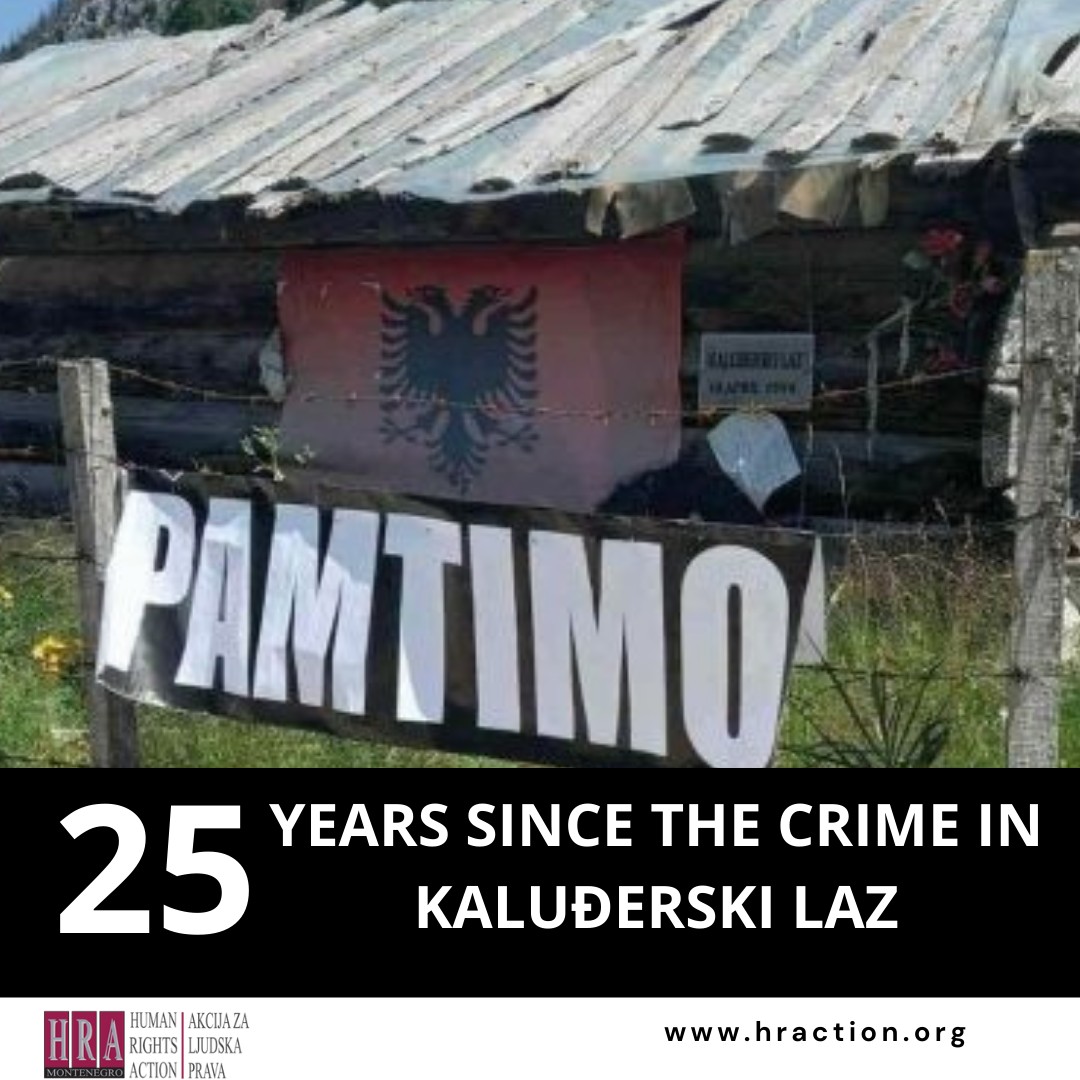
25 YEARS SINCE THE CRIME IN KALUĐERSKI LAZ
18/04/2024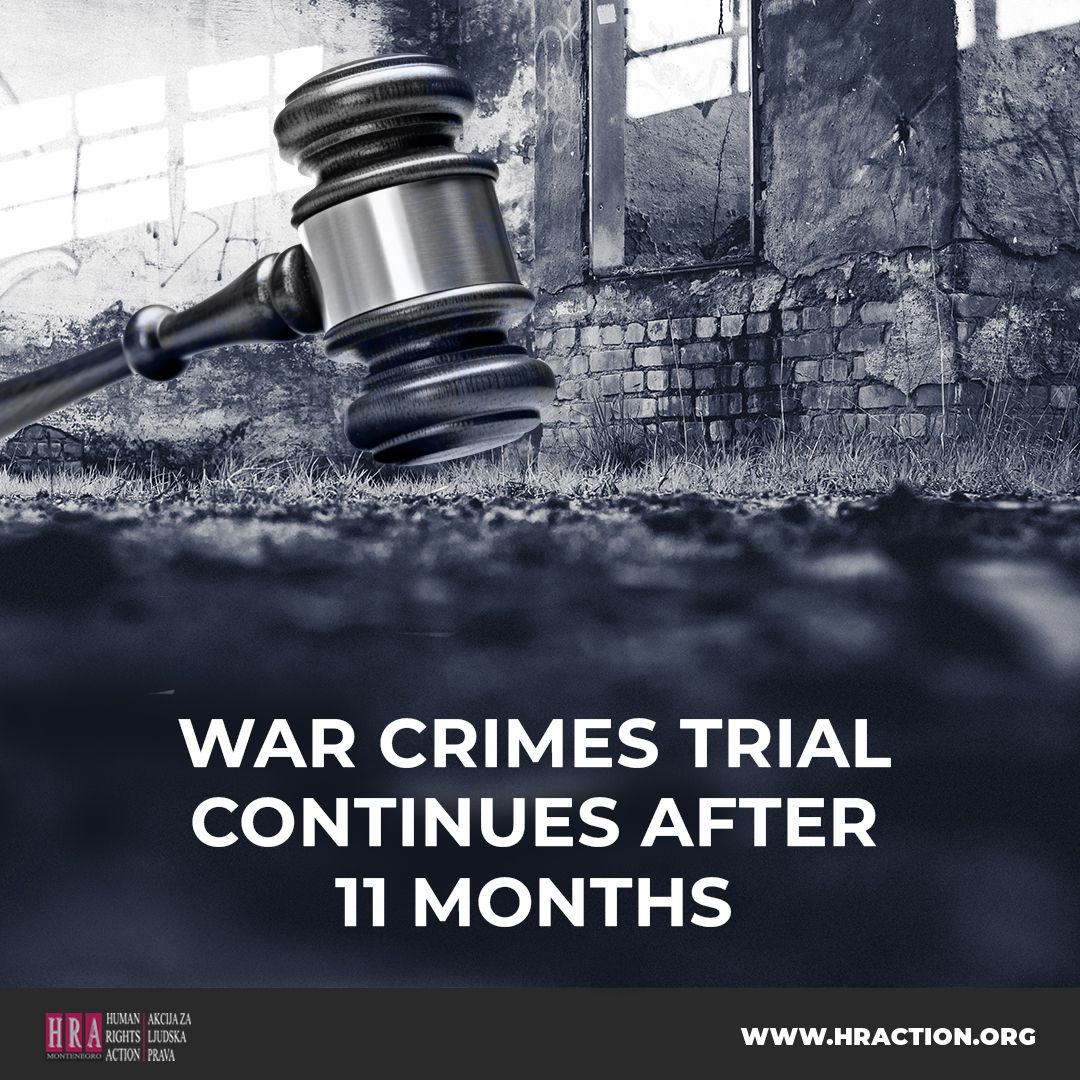
WAR CRIMES TRIAL CONTINUES AFTER 11 MONTHS
23/04/2024The number of NGOs and prominent individuals who support the Initiative for Montenegro to sponsor the UN Resolution on the Remembrance of the Srebrenica Genocide has increased to 75 NGOs and 65 individuals
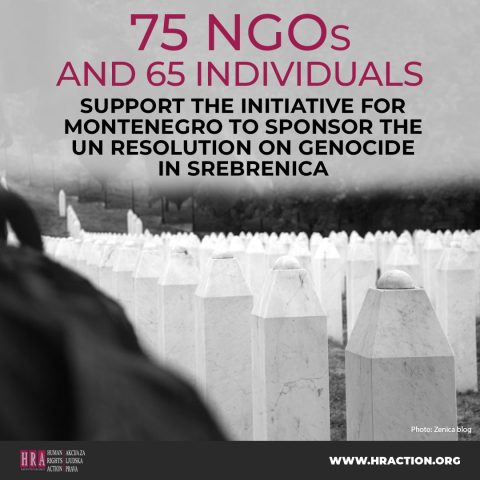
Over the weekend, the initiative for Montenegro to sponsor the UN Resolution on the Remembrance of the Srebrenica Genocide (International Day of Remembrance and Commemoration of the Srebrenica Genocide in 1995) was supported by another 14 CSOs and 50 individuals, mostly public figures, lawyers, artists, professors, journalists, representatives of the cultural scene, etc.
The initiative is now supported by 75 civil society organizations and 65 prominent individuals in Montenegro, and the number continues to grow. The text of the initiative and the list of all signatories are available here.
Gathering support for the initiative is still ongoing, given that the Government at its last session on Thursday did not consider the initiative to sponsor the aforementioned resolution together with Slovenia, Croatia, North Macedonia, the USA, Germany and other countries.
Yesterday, the Montenegrin European Party supported the initiative. Previously, the initiative was supported by the Bosniak Council, as well as the Bosniak Party, the Liberal Party, the Democratic Party of Socialists, the Social Democratic Party of Montenegro, the Social Democrats of Montenegro and the Albanian Alliance coalition.
We invite the media to publish the text of the Draft Resolution, the original text of which is available here in English, in Montenegrin here, and translated into Serbian here.
Translation into Bosnian language is available on the publication of the Potočari Memorial Center.
The resolution is not directed against any nation. This fact is obvious from its text.
The genocide in Srebrenica was committed by individuals convicted before the Hague Tribunal and the courts in Bosnia and Herzegovina, and not the entire Serbian people, as has been incorrectly portrayed. The resolution condemns the denial of genocide and glorification of war criminals, emphasizes the importance of completing the process of finding and identifying the remaining victims and calls for continuation of the criminal prosecution of responsible perpetrators.
A similar resolution on genocide in Rwanda was adopted by the General Assembly in 2003 and that text is also available here.
HRA calls on the Government to support this resolution by sponsoring it, so that Montenegro can show appropriate determination on the international stage to prevent repetition of any such or similar crimes.
The vote on the draft resolution in the UN General Assembly is scheduled for May 2.
Supporters of the initiative:
NGOs:
- Advisory Group “Balkans in Europe” (BiEPAG), Jovana Marović
- Human Rights Action, Tea Gorjanc Prelevic
- Active zone, Miloš Marković
- Center for Civic Education, Daliborka Uljarević
- Center for Women’s and Peace Education ANIMA, Ljupka Kovačević
- Center for Women’s Rights, Maja Raičević
- Center for Investigative Journalism of Montenegro, Milka Tadić Mijović
- Center for Democratic Transition, Milica Kovačević
- Center for the Development of Non-Governmental Organizations, Zorana Marković
- Montenegrin Committee of Lawyers for Human Rights, Velija Murić
- Media Institute, Olivera Nikolić
- Juventas, Ivana Vujović
- Prima, Aida Perović
- Spektra, Jovan Ulićević
- Association “Strpci – Against Oblivion”, Demir Ličina
- Agency for Local Democracy, Kerim Međedović
- Agora Femina, Maja Bogojević
- Anti-fascists of Cetinje, Filip Kuzman
- Bona fidae, Pljevlja, Sabina Talović
- Center for multimedia production
- Center for Affirmation of RE Population (CAREP), Nardi Ahmetović
- Center for Civil Liberties (CEGAS), Marija Popović Kalezić
- Center for Democracy and Human Rights (CEDEM), Nevenka Vuksanović
- Center for Monitoring and Research (CeMI), Zlatko Vujović
- Center for Roma Initiatives, Fana Delia
- Bihor Cultural Center, Mirsad Rastoder
- Montenegrin LGBTIQ Association Queer Montenegro, Staša Bistrica
- Montenegrin PEN Center, Boban Batrićević
- Montenegrin Philological Society, Milan Marković
- Montenegrin Helsinki Committee, Miodrag Vlahović
- Montenegrin Women’s Lobby, Aida Petrović
- Danilovgrad Montenegrins, Alek Barović
- ERA – LGBTI Equal Rights Associationfor Western Balkans and Turkey, Danijel Kalezić
- Eduko plus, Almedina Dodić
- Expeditio, Tatjana Rajić
- Civic initiative “21 May”, Rade Bojović
- Civic Alliance, Milan Radović
- Construction site, Goran Janković
- Breathe, Maja Gardašević
- Don Bosco Center, Ana Koljčević and Marjan Camaj
- Society of Montenegrin Publishers, PhD Vladimir Vojinović
- Husein Pasha, Pljevlja, Denijal Geljić
- Ikre, Rožaje, Velida Hodžić
- Youth Initiative for Human Rights, Edina Hasanaga Čobaj
- Initiative for Regional Cooperation of Montenegro (Igman Initiative), Andro Martinović
- Ulcinj Info, Mustafa Canka
- IPO Montenegro, Momčilo Šćekić
- Ipso Facto, Milena Popović Samardžić
- Institute for Gender Equality “Dulcinea”, Ulcinj, Hatixha Gjoni
- Komunica NG, Podgorica, Vladimir Nikaljević
- Mrav, Rožaje, Munevera Sutović
- Bridge of Culture, Podgorica, Ivan Jokanović
- Monitoring Group Ulcinj – Mogul, Xhemal Peroviq
- Our Action, Patricia Pobrić
- Novi Horizon, Ulcinj, Nazif Velić
- Municipal Association of Multiple Sclerosis Bijelo Polje, Lidija Guberinić
- Optimists, Ana Milović Jasikovac
- The first female ecological movement in Montenegro – Ecopatriotism, Ivana Čogurić
- Punta Institute, Ulcinj, Admir Gjoni
- Polygon for female excellence – Sofia, Rebeka Čilović
- Lawyer, Budislav Budo Minic
- Development of Vranj, Tuzi
- Radio Bruškin, Tomislav Žegura
- System, Neda Radović
- Safe women’s house, Budislavka Mira Saveljić
- Heart, Dusan Rakočević
- SOS Nikšić, Nataša Međedović
- SOS Rožaje, Raza Nurković
- Student organization Adamas
- Association of Lawyers of Montenegro, Branislav Radulović
- Association of Youth with Handicap of Montenegro, Marina Vujačić
- Association of History Professors HIPMONT, Miloš Vukanović
- Association of LBTQ women “Stana“, Ana Dedivanović
- MNE Forum, Elvira Hadžibegović
- Forum of Bosniaks of Montenegro, Husein Ceno Tuzović
Prominent individuals:
- Dina Bajramspahić, civil activist
- Zenepa Lika, civil activist
- Tamara Milaš, civil activist
- Boško Milović, civil activist
- Goran Đurović, civil activist
- Aleksandar Srdanović, civil activist
- Miodrag Iličković, retired judge of the Constitutional Court of Montenegro
- Aleksandar Saša Zeković, independent councilor in the Assembly of the Capital City of Podgorica
- Edin Smailović, historian
- Mladen Zadrima, journalist
- Veseljko Koprivica, journalist and writer
- Tanja Pavićević, journalist and civil activist
- Milena Perović, journalist
- Vesna Rajković Nenadić, journalist
- Duška Pejović, journalist
- Damira Kalač, journalist
- Tamara Ivanović Ivanković, journalist
- Jelena Nelević Martinović, journalist and poet
- Mila Vukčević, journalist
- Emina Kalač, Master of Journalism
- Dalibor Tomović, lawyer
- Veselin Radulović, lawyer
- Damir Lekić, lawyer
- Aleksandar Đurišić, lawyer
- Siniša Gazivoda, lawyer
- Jasna Tatar Anđelić, professor at the University of Montenegro
- Olivera Komar, professor at the University of Montenegro
- Nebojša Vučinić, law professor and former judge of the European Court of Human Rights
- Nađa Durković, professor of literature
- Miroslav Minić, professor of Montenegrin language and literature
- Svetlana Jovetić Koprivica, professor of Montenegrin language and literature
- Paula Petričević, professor of philosophy
- Mladen Živković, professor of sociology
- Petar Pejaković, professor at the University of Montenegro and theater director
- Boban Batrićević, professor at the Faculty of Montenegrin Language and Literature
- Rastoder Sherbo, PhD, academician of CANU, DANU and vice-president of BANU, editor of “Almanac”
- Nikoleta Đukanović, assistant professor Ph.D.
- Ljubomir Filipović, political scientist
- Orhan Šahmanović, graduate in law
- Nela Krnić, master of legal sciences
- Anđa Backović, psychologist
- Biljana Rudan, psychiatrist
- Varja Đukić, actress
- Stevan Radusinović, actor
- Biljana Keković, painter
- Marija Backović, scientist
- Jelena Vukasović, cultural worker
- Marija Perović, director
- Nikola Vukčević, director
- Ognjen Spahić, writer
- Vojislav Pejović, scientist and writer
- Tanja Bakić, writer
- Vildana Šašić, graduated musician
- Dušan Pajović, left-wing activist and writer
- Vladimir Vučinić, cinematographer
- Sanja Orlandić, philologist
- Nina Redžepagić, communication specialist
- Milena Bošković, communication specialist
- Snežana Burzan Vuksanović, culture manager
- Asja Šašić, television producer
- Maja Mrđenović, theater scholar
- Miloš Petričević, archaeologist
- Ćemal Ljuca, graduate in criminology
- Nebojsa Mandić, citizen
- Bilsana Bibić, citizen


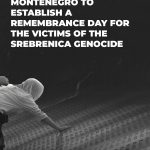
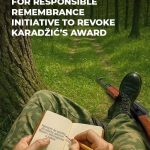



 English
English